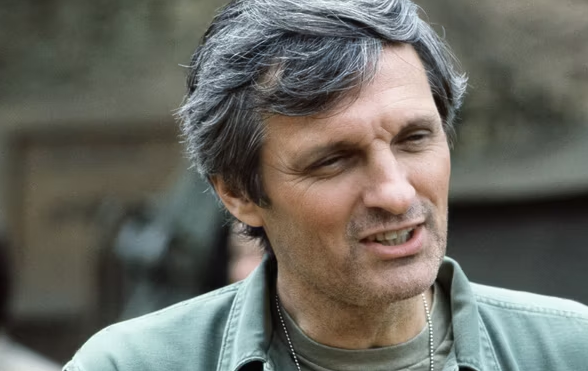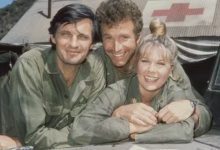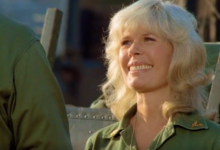M*A*S*H’s Hawkeye Was Based on a Real Person and He Hated the Series
Despite being off the air for 40 years, M*A*S*H* remains one of the most popular TV sitcoms ever produced. The show won 14 Primetime Emmys and eight Golden Globe Awards during its 11-season run from 1972 to 1983, firmly cementing its place in the annals of all-time great television. Of course, it’s easy to assume the movie is an adaptation of the hit 1970 Robert Altman film of the same name. In reality, both versions are adapted from the novel MASH: A Novel About Three Army Doctors by Richard Hooker.
Richard Hooker is the pen name of Hiester Richard Hornberger, the man who inspired the iconic character of Captain Benjamin Franklin “Hawkeye” Pierce based on his experience in the Korean War. In the movie, Hawkeye is played by Donald Sutherland. In the sitcom, Hawkeye is played by Alan Alda, who won four Primetime Emmys and five Golden Globes for his work on the show. Yet for all the success Alda and the show had during its 251-episode run, Hornberger downright detests M*A*S*H* and its representation of Hawkeye. The reasons why may shock even the biggest fans of the show.
H. Richard Hornberger’s Military Experience

Hiester Richard Hornberger Jr. (above left) was born in Trenton, New Jersey in 1924. Upon graduating from Cornell Medical School, Hornberger was drafted by the U.S. military to serve in the Korean War in 1950. In the classic TV sitcom, Hawkeye serves as a Mobile Army Surgical Hospital (MASH) doctor in the fictional unit 4077. In reality, Hornberger served as a doctor in the 8055 MASH unit. As seen in the show, Hornberger’s unit was not on the frontlines of combat but nearby, with army tents and stretchers doubling as living quarters and medical equipment.
According to BBC News, Hornberger saw as many as “1,000 casualties a day” in the 8055 MASH unit while serving in Korea. While this was impossible to recreate in a half-hour sitcom, the downtime between battle and nursing wounded soldiers often provided time to play and fool around. One of Hornberger’s colleagues says there were:
“Long periods when not much of anything happened in an atmosphere of apparent safety—plenty of time to play … When things were quiet we would sit around and read. Sometimes the nurses would have a little dance.”
This playful downtime became the basis of the rewatchable TV sitcom’s humorous conceit. The dangers of war on the periphery are relieved by the comedic hijinks and wacky shenanigans the doctors indulge in during their downtime. The sense of humor Hawkeye has in the show comes from Hornberger’s brand of humor, with one of his colleagues describing the doctor as “A very good surgeon with a tremendous sense of humor” (Hartford Courant). Hornberger used his military experience to write MASH: A Novel About Three Army Doctors in 1968 and 14 follow-up MASH novels were published between 1972 and 1977.
Why Did Hornberger Hate M*A*S*H*?

Although Hawkeye’s playful sense of humor was faithfully adapted in the sitcom, Hornberger loathed M*A*S*H* for several reasons. The first is financial. According to the History Channel, Hornberger was paid a paltry $500 per episode of the hit CBS sitcom, a mere pittance for such a popular, highly-watched, award-winning program that lasted over a decade. Hornberger hardly profited from his contributions to the show, which pulled from invaluable life experiences and heroic military sacrifices. In addition to his lack of financial compensation, the main reason Hornberer hated M*A*S*H* is far more political.
During its run on CBS from 1972 to 1983, M*A*S*H* famously evolved from a silly sitcom to a serious TV show espousing anti-war sentiment. The Korean War became a real-time allegory for the Vietnam War, necessitating a tonal shift to give viewers a sense of comfort and catharsis. Once the show began voicing its support for anti-war messaging, Hornberger slowly removed himself from the franchise. A hawkish conservative for life, Hornberger did not appreciate how he was perceived as a liberal dove by the public. Moreover, Hornberger hated Alan Alda’s portrayal of him and preferred Robert Altman’s movie over the TV show and Donald Sutherland’s performance over Alda’s (via The Literary Encyclopedia).
In 1983, during M*A*S*H*’s final year on the air, Hornberger told Newsweek that, despite authentically recreating the Swamp Tent he served in during the Korean War, the show “tramples on my memories” (via PBS). Meanwhile, Hornberger’s son told the New York Times, “My father was a political conservative, and he did not like the liberal tendencies that Alan Alda portrayed Hawkeye Pierce as having.”
Hornberger’s Life After M*A*S*H*

Although Hornberger voiced his contempt of M*A*S*H* for financial and political reasons, he continued to write and practice medicine following his experience with the long-running sitcom. While the literary sequels to M*A*S*H* were nowhere near as successful as the original, Hornberger wrote 14 novels, with 12 co-authored by William E. Butterworth. Hornberger also continued his career as a surgeon until he retired in 1988.
According to his New York Times obituary, Hornberger continued his surgical practices in Waterville, Maine until 1988, five years after M*A*S*H* ended its run. In addition to performing surgery until 1988, Hornberger also conducted research published in peer-reviewed medical journals. Roughly one decade later, Hornberger died of Leukemia in 1997 at the age of 73. Although he reportedly hated M*A*S*H* and Alan Alda’s award-winning depiction of him, there’s no denying Hornberger’s lasting contributions to one of the greatest sitcoms of all time. M*A*S*H* is available to stream on Hulu.

